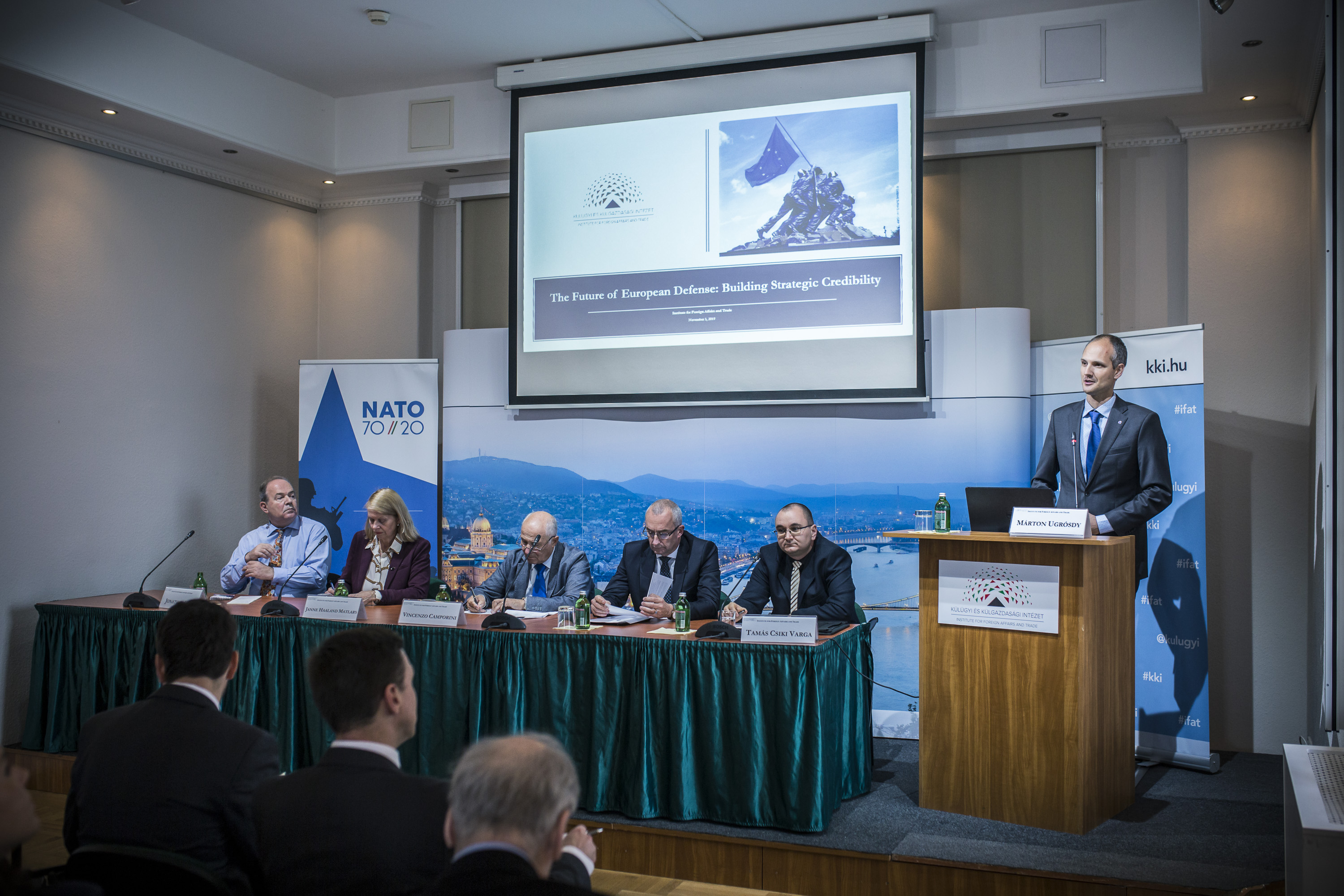On the 5th of November, IFAT held a public conference on European defence initiatives and the future of security cooperation. The conference, which attracted a wide audience, gave an opportunity to present various national perspectives on the meaning of European strategic autonomy and the challenges we face in deepening European defence cooperation with the contribution of well-known distinguished experts from various European EU and non-EU member states.
The event was opened by Márton Ugrósdy, Director of IFAT, followed by a keynote speech of Péter Sztáray, Minister of State for Security Policy at the Ministry of Foreign Affairs and Trade. Minister of State Sztáray highlighted that the transatlantic bond faces serious challenges presently, which is not only an economic, but also a political issue. He emphasized that European defense institutions started to change following an increase in the level of European ambitions. He pointed out that there is a need for a higher level of operational autonomy in Europe, which would unavoidably involve duplications with NATO to a limited extent. Minister of State Sztáray also added that Hungary will carry out one of its largest military modernization programs of its history.
Tamás Csiki Varga, Research Fellow of the Institute for Strategic and Defence Studies moderated the first panel discussion. Jonathan Eyal, Associate Director of the British Royal United Services Institute told that the presidency of Donald Trump is an exception in a sense that President Trump considers breaking up the EU as an American interest. Dr. Eyal argued that paradoxically Trump’s isolationist attitude only strengthened the Congressional support for US military presence in Europe. The expert told that real action should be taken in European security policy instead of creating more institutions and acronyms.
Janne Haaland Matláry, professor at University of Oslo shared the assessment about European states’ willingness to give up their sovereignty in the field of defence policy. She emphasized that the lack of common strategic culture is a crucial problem in many European countries. Professor Matláry argued that more money should be spent on defense, but it is not sufficient in itself and strategic credibility should be built up. She predicted that future cooperation frameworks are going to be bottom-up initiatives. General Vincenzo Camporini, formal Chief of Defence of the Italian Armed Forces underlined that military investments are not ends in themselves, rather instruments and one should be very careful about speaking of a “European Army”. He considered the decision to open up PESCO (Permanent Structured Cooperation) to all member states a mistake but expressed his sympathy with the European Defense Fund. General Camporini argued for the integration of European defense industry due to cost-efficiency reasons.
The second panel discussion, which was moderated by Gergely Fejérdy, Senior Research Fellow of IFAT, questioned whether European Army is a fantasy or a realistic solution. Brigadier General Rainer Meyer zum Felde stated that an independent European Army is not likely to be established in the foreseeable future. However, the General said that he is optimistic about some other kind of European Armed Forces and Maritime Forces, which would be smaller in scope. Katalin Horváth, Deputy Head of Section of Ministry of Defence declared that Hungary wants the EU to become a global security player and to build a strong European pillar of NATO. She made it clear that security cooperation is a political question and political integration is a precondition of a meaningful security integration.
Frederic Mauro, Associate Researcher of IFRI said that a European Army already exists, but it is led by the USA. He argued that the problem is not the money, as Europe spends five times more on defence than the Russian military budget, but that “Europe has around 28 Pentagons”. Gergely Varga, Senior Research Fellow at IFAT emphasized that US military support for Europe remains to be strong, but a turning point may arrive sometime in the not so distant future when Washington have to relocate its forces to handle more imminent threats in other parts of the world, especially in the Indo-Pacific region. Therefore, the theoretical conditions of the creation of the European strategic autonomy are worth to be examined in order to have a clear picture of where we are and what is realistic to achieve for Europeans.

